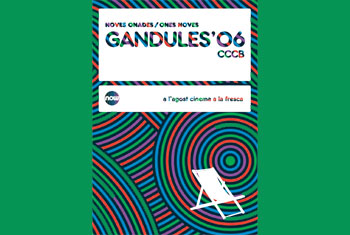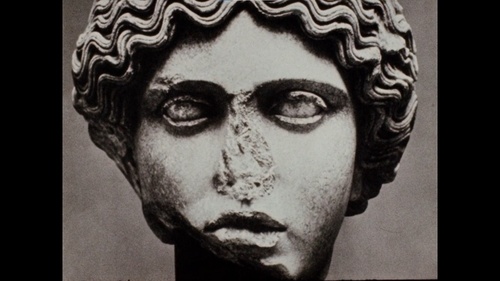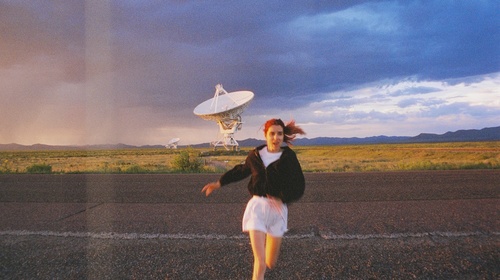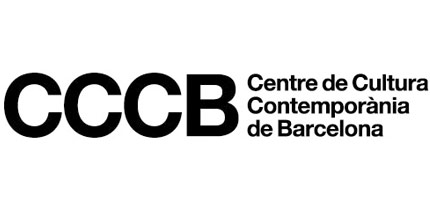Gandules
Gandules'06
New Waves / New Trends
Audiovisuals + Festivals
Free
This August, Gandules is back in the Pati de les Dones with a new programme of open-air cinema. In the framework of NOW, New Waves / New Trends sets out to discover the spectrum of new waves in the cinema in its endeavour to find a way to film social, artistic, spiritual and technological transformations from the viewpoint of the present.
To mark the cultural changes of an age, filmmakers have had to find new ways of filming. The resulting cinema has shaped new stylistic trends as youth movements have revolutionized it. But the cinema has also captured cultural innovations, large and small: gestures, fashions, songs, words and rhythms.
In the framework of NOW, New Waves / New Trends presents the connections between new trends in the cinema and cultural and ideological changes. It is a cycle about a new film narrativity and its search to portray social, artistic, spiritual and technological transformations from its place in the present continuous.
PROGRAMME
Week 1
Tuesday 1 August
Carl-Theodor Dreyer, De nåede færgen/ They Caught the Ferry (1948), 11'
A young couple ride their motorbike as fast as they can to catch the ferry. Dreyer experiments with speed to produce this exceptional project in his career.
Jean-Luc Godard, Pierrot le fou (1965), 110'
Marianne and Ferdinand meet once again in Paris and embark on a journey to the south of France full of "sound and fury". The cornerstone of Godard's 1960s films, which mark the end of his earlier research and explore that of the next 40 years.
Wednesday 2 August
José Luis Guerin, Souvenir (1985), 5'
A girl's memories of the sea and Paris.
François Truffaut, Antoine et Collette in L'amour à vingt ans (1962), 30'
After Les 400 coups, Truffaut follows the life of Antoine Doinel and films the love affairs he had at the age of 20.
Jean Eustache, Le père Noël a les yeux bleus (1966), 47'
The sentimental education of a young man who lives in a provincial town and has to work as Father Christmas.
Thursday 3 August
Pier Paolo Pasolini, Comizi d'amore/ Love meetings (1964), 90'
Pasolini travelled the peninsula asking the Italians about sex. To conduct the survey, he questioned people of all religions and social classes: farmers, labourers, footballers, students, holidaymakers, the bourgeoisie, etc.
Week 2
Tuesday 8 August
"And When the Sky was Opened," The Twilight Zone (1962), 26'
The story of a space mission that returns to Earth and the gradual disappearance of its crewmembers, which only the lead character seems to notice.
Jack Arnold, The Incredible Shrinking Man (1957), 81'
While on holiday at sea, a man is exposed to some strange radiation. As a result, his body starts shrinking. The two pieces, written by Richard Matheson, show how the fantastic genre captured the fears of the time.
Wednesday 9 August
Werner Herzog, The Wild Blue Yonder (2005), 81'
Humorous science fiction fable, based on NASA archives, about an alien on the earth and an expedition lost in space.
Thursday 10 August
Chris Marker , La Jetée (1962), 29'
After a nuclear war, a man travels in time to recover the lost image of a woman. A lyrical essay, using photographs, about memory and the frantic pace of time.
Peter Watkins, The War Game (1965), 48'
Documentary fiction, banned by the BBC, about the effects of a Soviet nuclear attack on Great Britain.
Week 3
Wednesday 16 August, at 10 p.m.
Videos by Jim Jarmusch: It's Alright With Me, by Tom Waits (1990)/ I Don't Wanna Grow Up, by Tom Waits (1992)/ Dead Man, by Neil Young (1996)
Monte Hellman, Two-Lane Blacktop (1971), 102'
A racing driver and his mechanic travel around the United States behind the wheel of a Chevrolet 55 in search of illegal races. On their travels, they meet a young woman and a conceited speed enthusiast. A mythical film in new North American cinema.
Thursday 17 August, at 10 p.m.
William Klein, Broadway by Light (1958), 12'
The first pop film. "The North Americans invented jazz as consolation for death, and stars as consolation for women. As consolation for night, they invented Broadway" (Chris Marker). "The first movie in which the use of colour is necessary" (Orson Welles).
Ronald Nameth, Andy Warhol's Exploding Plastic Inevitable (1967), 12'
A musical piece about a concert by Nico and Velvet Underground, and the formal power of the cinema: colour, speed, superimposition...
Jonas Mekas, Notes for Jerome (1978), 45'
A diary in eulogy form filmed by Mekas, dedicated to his friend Jerome Hill, which becomes a film about holidays, memories of the sea, the sun and the villages of Provence.
Week 4
Tuesday 22 August
Johan van der Keuken, Vakantie van de filmer/ The Filmmaker's Holiday (1974), 39'
Images of a happy family summer in a little village in the South of France, in a house by a river, alternating with the dialogues of old men and women, the village's only inhabitants, photographs and documentaries. Filmed in colour using a small camera that only allowed 24-second shots.
Naomi Kawase, Katatsumori/ Snail (1994), 40'
Kawase filmed an intimate Super 8 portrait of her grandmother in the garden: the repeated gestures, the tenderness, and the cycle of the plants...
Wednesday 23 August
Jean Renoir, Sur un air de Charleston (1927), 21'
Renoir's passionate eulogy of his actress and wife, his father's former model. An African scientist travels by spaceship to Europe, where, in the aftermath of a disaster, the only survivors are a wild young woman and an ape. She teaches him to dance the Charleston with wild abandon.
Chantal Akerman, Un jour Pina m'a demandé (1983), 57'
Akerman followed choreographer Pina Bausch and her team on a summer tour around Germany, Italy and France: the work, the preparation, the music, but also the gestures of dance, love and rebellion.
Thursday 24 August
Albert and David Maysles, Gimme Shelter (1970), 91'
Chronicle of a mythical Rolling Stones tour around the US, with a tragic ending: at a concert in Almont, the Hell's Angels were hired to keep order and beat up concertgoers, resulting in a death. One of the great rock documentaries.
Week 5
Tuesday 29 August
Hou Hsiao-hsien, Lianlian fengchen/ Dust in the Wind (1986), 109'
A central work in Taiwan's nouvelle vague : an autobiographical film about life in a village, the journey to the city, first love and disappointment.
Wednesday 30 August
Roman Coppola, Funky Squaredance for Phoenix (2002) 10'
Autobiographical video about the difficulties of making one on a low budget.
Errol Morris, Fast, Cheap & Out of Control (1998), 82'
A documentary that interweaves stories about a robotics scientist, an expert in African rodents, a lion tamer and a topiary gardener. Prize for the best documentary awarded by the National Board of Review and the Independent Spirit Award.
Thursday 31 August, at 10 p.m.
Jean-Luc Godard, Dans le noir du temps , in Ten Minutes Older: The Cello (2002), 10'
An elegiac essay about the times and memories of the century of cinema.
Dziga Vertov, Celovek s kinapparatom/ The Man with the Movie Camera (1929), 65'
This film, the culmination of avant-garde movement and the "Soviet Montage", uses music to draw together many different themes: a day in a city, the screening of a film (the one being shown), the work of the man with the movie camera as he chases images and that of the film editor... A fast and furious urban symphony and the story of a film that is made before our eyes.
This activity is part of Gandules 2006, Gandules, NOW 2006




